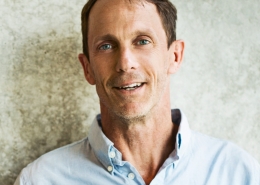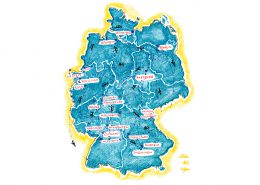The New School of Brand Management
Brands can achieve communication success all on their own – without classic advertising. Tesla, MyMüsli and Westwing are prime examples of this. The paths they took, what demands are being placed on the marketing of tomorrow – and how agencies can prepare themselves.
The advertising world used to be quite predictable. Back in the day, there were three cornerstones for marketing success: a fat budget, wide reach and clear positioning. This classic mix is not out by any means – one might even say the watering can principle works fine if you want to sell gummy bears, cars or moisturiser. Others have, however, completely given up on classic campaigns, or no longer consider them an interesting option when it comes to reaching the hearts and minds of consumers. But their alternative approaches do work. According to the YouGov BrandIndex for example, over 60% of the population in Germany are familiar with the crazy car builders at Tesla. What did they spend to achieve that level of awareness? Virtually nothing. Tesla spent just 23,000 euros on ads in German magazines last year. And absolutely nothing on television, radio and internet advertising.
Tesla is not an isolated case: breakfast brand MyMüsli and online furniture company Westwing are all brands that have gained huge popularity in entirely new ways. The products are completely diverse, like the brains behind them. Yet there are textbook similarities that could be taught at the modern school of brands:
A good story
A new product should have its own story. Not just any old story, but one that stands out, that is different and interests people. And of course it has to reflect the current zeitgeist. Successful brands pick up on megatrends, but in an unconventional, sometimes even surprising way. Tesla chose to surf the wave of environmental awareness that has seen a massive surge in the last decade. So far, so sensible. On top of that, they added their own element of surprise: by making cars that offer a stark alternative to the eco-style, functional-looking solar mobiles we were all expecting. This pioneering electric mobility is packaged in an extremely chic, desirable and expensive vehicle. An elitist product that clearly separates smart ecological awareness from traditional green smugness. They then launched a mass model onto the market that is affordable for many and still provides the owner with an air of exclusivity – and a clear environmental conscience.
This also works on a smaller scale. MyMüsli picked up on the ever-growing organic trend in nutrition and then turbo-charged it by making the product both customisable and convenient: organic muesli that you can put together yourself from 80 organic ingredients with a few clicks online. All you have to do then is give your muesli blend a customised name, place your order and it will be delivered by courier directly to your breakfast table. Pour on milk and enjoy. Cool, as well as healthy: that’s how we are living and eating today. And in order to show what is truly possible, the product developers did the maths: according to the company, 566 quadrillion different cereal combinations are possible and it would take several lifetimes to get through them all! You literally can’t get more variety than that. A nice story that resonates with every cereal maniac and is memorable and ready to be retold.
The quick-and-easy-feeling that the internet gives us has also been picked up on by Westwing. Here a group of smart people put their heads together and looked around at what was happening in the world of interiors. Hardly any other country spends so much money on the interior of their homes as we Germans do. And we also like to spend lots of time at home – what used to be called “cocooning” is now known as “hygge”, the Danish word for comfort. So it makes sense to find a way to save us from venturing to the outskirts of cities to shop at giant furniture stores. Instead, the clever start-up sends trendy brand-name furniture and interior accessories to our homes at affordable prices. And as it is usually women who choose the furniture at home, a set of new chairs can now be ordered just as easily as a pair of shoes from Zalando.
The shooting stars
Brands that move people and awaken interest will inspire and turn customers into fans, who then become part of the brand. Participation is the new mantra. It also helps if the managers have a good media presence because successful brands and their stories need narrators. And they need a stage. You have to want and be capable of it. Self-marketing had long been dismissed as personal vanity, and is still considered bad taste even now. But those who master the art of personal presentation don’t really care. They do their thing for the sake of marketing their brands.
Tesla’s Elon Musk is a perfect case in point: a billionaire visionary as the face of the company. A man who wants to pave not only the way for e-mobility on the mass market, but also repeatedly makes headlines in the international press with his other high-profile projects, which range from reusable rockets to the colonisation of Mars, and plans for a tube underneath Los Angeles that shoots cars from A to B, cleverly avoiding the traffic jams. A positively crazy example of a guy, who ensures for perfect storytelling and thus continues to recharge his brand’s image over and over again.
The German counterparts are far more modest, but also very effective. Both the MyMüsli management trio, all of whom are former students from Passau, as well as Deliah Fischer of Westwing are celebrated and showered with accolades as exemplary entrepreneurs. None of them is afraid to go on talk shows or drum up media attention for their own brand. And they always leave a fresh and likeable impression. No doubt Deliah Fischer, who studied journalism, has contributed most to Westwing’s popularity so far. A superwoman who is first the face of a vision, then an idea and finally a brand. Buying at Westwing means buying a slice of her spirit. Just like Elon Musk is somehow the invisible passenger in the Tesla with you. A good feeling.
Discover the new possibilities
These three start-ups have largely dispensed with traditional advertising channels. They have a different business model and they also do their advertising differently. They live and breathe the game change consistently, in everything they do. And that’s a good thing. Three days after the launch of MyMüsli in 2007, it had already had 16,500 Google hits. Later, the founders made their first TV commercial, edited completely on an iPhone due to limited resources. But they can meanwhile afford to invest in traditional advertising and spent to the tune of 677,000 euros on ads last year – but mainly in the shape of modern, interactive formats.
MyMüsli was a media hit because the founders recognised the signs of changing consumer interests and adapted in a smart way. Powered by Elon Musk, Tesla is a runaway media success. The marketers behind Westwing are Rocket Internet, who really know how to promote a start-up on the web – running content on all channels of social media available, as well as influencer marketing. It’s the art of winning people over without a big budget and classic ads. And that works brilliantly on the internet, which is why it’s often the favourite medium of this new school of brands.
Data is the new currency
Let’s take a look ahead to where the next Tesla, MyMüslis and Westwings will come from. For the foreseeable future, the internet will remain the first choice for new brands. However, new channels will continue to open up and offer new ways of addressing customers. And what does “foreseeable” even mean? Change is taking place at almost breakneck speed. Which are the communication channels of tomorrow or even the day after tomorrow? Agencies and marketers need to have their finger on the proverbial pulse, always one step ahead, in order to adequately deliver on the next big thing.
Take Facebook, a platform that is relevant just on the strength of its sheer size. But in the blink of the eye it shifted from being the favourite medium of the young to that of their parents. Influencer marketing works now, but will it still work tomorrow, when the target group is a few years older? Today we use WhatsApp to communicate. Tomorrow it could already be WeChat, the platform on which every Chinese person spends an average of 70 minutes a day. And the reason for this is because it offers additional benefits for communication, like sharing people’s respective locations.
Of course, the agencies all got the memo about new spheres of communication and forms of marketing a long time ago. They are continually developing new strategies and new paths of communication that go beyond traditional advertising. They sit down with the founders of smart new products and services in the early stages, serving as sounding boards for the development of the perfect story and thinking about how and where to best tell it to the world. After all, we can’t all be Elon Musk, who functions almost as a one-man campaign.
Big data plays an important role in modern communication. Data is the new currency for communication – socio-graphic data, interests, purchasing intentions. We are only at the beginning of making use of it all. Individualised marketing with a targeted, personal approach is the goal. By means of data and platforms that evaluate the data, customer centricity will continue to improve and become more accurate in the future. In this context, some people have stopped talking about big data, calling it extreme data instead. Thanks to new satellite technology, for example, it will be possible to locate people, say, approaching a Starbucks, and to then send them a coffee-related message on their smartphone. The question is whether the customer would actually appreciate that – or whether or not they will go elsewhere to drink their flat white just out of spite. Bombarding people might ultimately be worse than the watering can principle. It may cost a lot of money and spread the message rather randomly. But even attracting too much attention and being too pushy can backfire badly. That’s when the ad blocker principle comes into play. After all, it’s not always a good idea to exhaust every single opportunity just because we can.
There is a certain oversaturation when it comes to advertising, not just on the net, but there in particular. Many users think self-launching videos or pop-up advertising campaigns on websites are a major pain in the A. Sure, sometimes bugging someone is also a good way to get their attention. But to counteract the eye-rolling and closing down of windows, data and platforms are needed that can process information and target audience segments in order to create true customer centricity.
So what could this personal marketing that really hits the spot look like? In an ideal scenario, it’s the same principle that once held sway at the local corner shop, which is why those who can still remember, miss it so sorely: you know each other, value each other and not only know what the customer usually buys – you also know what they do for a living, where their children go to school and what topics to talk with them about. Those who manage to come across as personal as in a corner shop situation will have the best chances of success.
That may also contribute to softening the impression that marketing and branding are increasingly the purview of only technocrats. Which isn’t the case at all. That technique may allow the dissemination of a brand, but when it comes down to it, algorithms aren’t very good at telling stories. And as things stand, it is questionable whether they ever will be able to.
Watch out, the un-customers are coming!
Last but not least, this is because there is a new and different breed of customer emerging: Generation Z, the Centennials, who are currently between 7 and 22 years old. According to a study*, they currently have a purchasing power of around 40 billion euros, which is why they are being courted at such an early stage. 80 million pretty cool guys and girls, growing up in a certain degree of prosperity, between financial crisis and the sharing economy. They are egocentric, but reflective. They are digital natives whose digital and real worlds are inseparable. They are highly educated, prudent, mindful of themselves and the world. Through their parents, they know their way around the world of brands. And buying something is an experience that they like to share with others. At first glance, this all looks like a wonderful opportunity for marketing. But only at first glance.
Caution! Generation Z is difficult to understand and a real challenge. Their priorities are to explore the world, followed by living healthy in a safe environment. And they are capricious: when it comes to consumerism, the product is in the foreground, not the brand. The product has to be good, otherwise even the greatest marketing won’t be able to save the day. As a customer, Generation Z is a hybrid, combining pasta from the discount supermarket with the finest ingredients from the health food store.
Centennials fall in and out of love with brands at the drop of a hat. Which doesn’t make marketing products to them any easier. It’s the generation of un-customers, fickle and hard to pin down. Making the product all the more important. It has to strike a chord. And really know how to tell a damn good story.
* “Gen Z/Digital Realitives”, Luxury Business Report, INLUX Institute, Munich, 2017
Illustrations: Claudia Meitert
Ronald Focken
Managing Partner of the Serviceplan Group
Ronald Focken has been a member of the Serviceplan family since 1990. In 2000, when he was 38, he took on the management of the Serviceplan holding company. His focus remains innovative brand management and facing the challenges of digital transformation and communication development. Ronald enjoys passing on his knowledge and experience to the next generation and is a visiting lecturer at the Brand Academy of the Markenverband (Brand Association) and the European Business School. As a consultant on current brand and communications topics, he is a popular speaker at various specialist business events. Whenever possible, the self-confessed family man and father of two daughters makes the most of his free time by travelling abroad and keeps himself fit with lots of different sports including cross and mountain biking, as well as skiing. His personal ad campaign would probably feature the slogan “Have fun!”. And one thing he always demands of himself: integrity.






